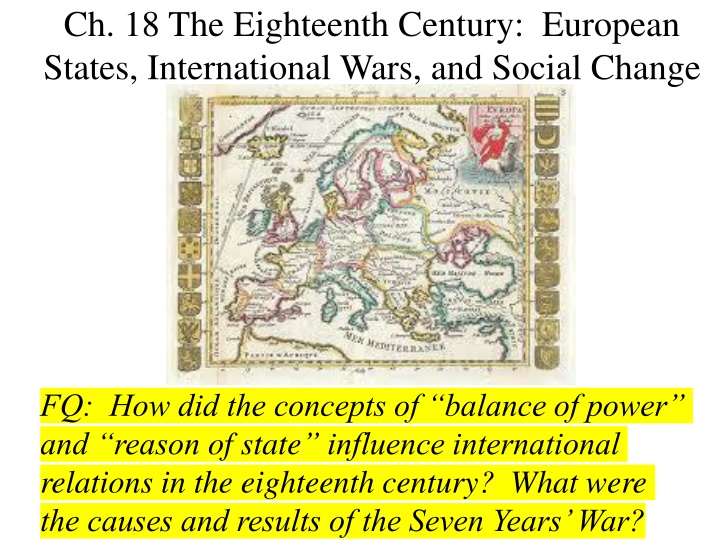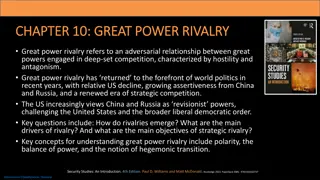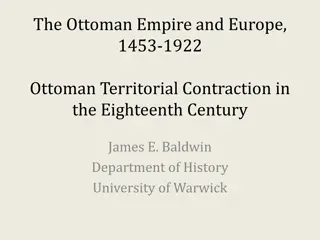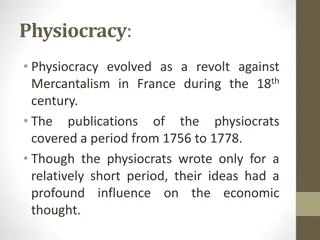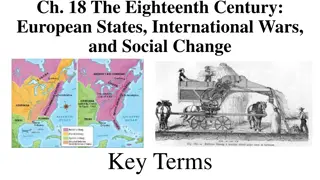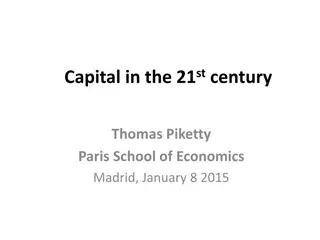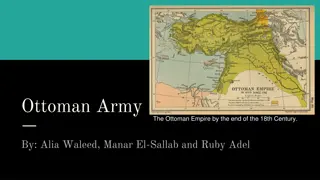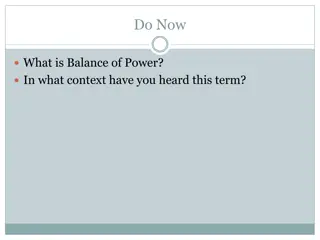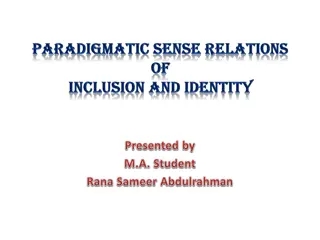International Relations in the 18th Century: Balance of Power and Conflict
In the 18th century, international relations were influenced by the concepts of balance of power and reason of state. The Seven Years War, a major conflict of the time, was sparked by power struggles and territorial ambitions among European states. The war had significant impacts, leading to shifts in alliances, geopolitical changes, and conflicts across Europe, India, and North America.
Download Presentation

Please find below an Image/Link to download the presentation.
The content on the website is provided AS IS for your information and personal use only. It may not be sold, licensed, or shared on other websites without obtaining consent from the author.If you encounter any issues during the download, it is possible that the publisher has removed the file from their server.
You are allowed to download the files provided on this website for personal or commercial use, subject to the condition that they are used lawfully. All files are the property of their respective owners.
The content on the website is provided AS IS for your information and personal use only. It may not be sold, licensed, or shared on other websites without obtaining consent from the author.
E N D
Presentation Transcript
Ch. 18 The Eighteenth Century: European States, International Wars, and Social Change FQ: How did the concepts of balance of power and reason of state influence international relations in the eighteenth century? What were the causes and results of the Seven Years War?
Review Question Define balance of power and provide one example from Ch. 18.
KEY TERMS Balance of power: a distribution of power among several states such that no single nation can dominate or interfere with the interests of another. Reason of state: principle that a nation should act on the basis of its long-term interests and not merely to further the dynastic interests of its ruling family.
Review Question List the two main causes of the War of Austrian Succession.
War of Austrian Succession (1740-1748) Sparked by the succession to the Austrian throne. Charles VI (1711-1740) left no male heir. Maria Theresa took over Austria. Frederick the Great of Prussia invaded and took Silesia from Austria. French allied with Prussia v. Austria & Great Britain. Treaty of Aix-la-Chapelle promised return of all occupied territories except Silesia, which led to future war.
Review Question What were the causes of the Seven Years War? What were the results? (List at least two for each)
The Seven Years War (1756-1763) The First World War Major European powers of the 18th century: Russia, France, Austria, Great Britain, Prussia. 1756 Diplomatic revolution led to allies and enemies mixing and matching. Britain v. France over colonial empires Prussia v. Austria over Silesia
Three major areas of conflict 1. Europe 2. India 3. North America
Conflict in Europe 1757 - Frederick the Great of Prussia was able to take on Austria, France and Russia in Battle of Rossbach. Prussia was eventually worn down over time. Peter III came to power in 1762 and withdrew Russian troops because he admired Frederick the Great. Peace of Hubertusburg all occupied territory returned and Prussia now controlled Silesia.
War in India France v. Britain was known as the Great War of Empire . French and British both supported opposing Indian princes. French eventually withdrew from India as a result of the Treaty of Paris in 1763.
The French and Indian War French began establishing forts from the Appalachians to the Mississippi. British saw this as a threat to their future expansion. French allied with native Americans through trade. British were revived by William Pitt the elder who believed the French colonial empire must be destroyed in order to establish a British world power.
Treaty of Paris - 1763 British navy had a big impact on the war. France gave up Canada and lands east of the Mississippi to Great Britain. France also withdrew from India making Great Britain the world s greatest colonial power.
FQ: What changes occurred in agriculture, finance, industry and trade during the eighteenth century?
Economic Patterns of the 18th Century Rapid population growth Expansion in banking and trade Agricultural revolution (Britain) Stirrings of industrialization Worldwide trade and consumption.
Growth of European Population Estimated European population 1700 120 million 1750 140 million 1790 190 million Decline in the death rate caused by: -better food (corn & potatoes) -farmer s surplus -end of Bubonic Plague
Historian Debate: Was there an agricultural revolution? Traditional interpretation: -more farmland -increased crop yields per acre -healthier and more abundant livestock -improved climate Some historians debate the timing and degree of an agricultural revolution.
Agriculture in England Enclosure acts: laws enacted in eighteenth century Britain that allowed large landowners to enclose the old open fields, thereby combining many small farmers to become tenant farmers or wage laborers on the large estates. Change in agricultural practices led to social consequences.
New Methods of Finance Gold and silver declined. Establishment of paper notes led to an increase in credit. Bank of England (1694) made loans using banknotes backed by credit. -public bonds led to national debt French were less confident in paper notes after their colonial trading companies experienced an economic collapse.
European Industry TEXTILES Woolen cloth made up 75% of Britain s exports. Cottage Industry couldn t keep up with new cotton demand. Rural workers saw new machines as a threat to their livelihood.
Mercantile Empires and Worldwide Trade Mercantilist theories were put into action by Europe s overseas expansion. Increase in overseas trade has led some historians to point out the emergence of a global economy in the eighteenth century. African slave trade and the plantation economy were key parts of the new Atlantic economy which led to greater prosperity for western European nations.
